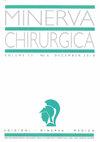Bottom-up suprapubic approach for robotic right colectomy: technical aspects and preliminary outcomes.
IF 1.3
Q3 Medicine
引用次数: 2
Abstract
BACKGROUND Complete mesocolic excision (CME) for right colectomy increase the technical complexity of a laparoscopic approach especially when an intracorporeal anastomosis (IA) is associated. The robotic platform, with its intrinsic technical advantages, could potentially overcome the limitations of conventional laparoscopy. This study aimed to describe the robotic bottom-up technique and to evaluate short-terms outcomes of robotic right colectomy (RRC) with CME and IA. METHODS Data from patients who underwent RRC for cancer with bottom-up suprapubic approach from October 2016 to April 2020 were prospectively collected and retrospectively analyzed. Intraoperative outcomes and complications, conversion rate, 30-day postoperative outcomes, incisional hernia rate and pathological outcomes were the variables assessed. RESULTS A total of 109 patients were submitted to bottom-up suprapubic approach for RRC with CME and IA during the study period. Mean operative time was 179 min, no intraoperative complications were observed, and the conversion rate was 3.6%. Mean postoperative stay was 4.6 days and the overall 30-day complication rate was 15.6%. Thirteen patients (12%) had minor complications, while major postoperative complications occurred in 4 patients (3.6%). Anastomotic leak was recorded in 1 patient (0.9%) and the 30-day re-admission rate was 0.9%. Mean number of harvested lymph nodes was 22.6. Incisional hernia rate at the specimen extraction site was 0.9%. CONCLUSIONS Bottom-up approach for RRC with CME and IA carries a low rate of conversions, intraoperative and short-term postoperative complications.机器人右结肠切除术的自底向上耻骨上入路:技术方面和初步结果。
背景完全中结肠切除术(CME)用于右半结肠切除术增加了腹腔镜手术的技术复杂性,尤其是当与体内吻合(IA)相关时。机器人平台凭借其固有的技术优势,有可能克服传统腹腔镜的局限性。本研究旨在描述机器人自底向上技术,并评估机器人右结肠切除术(RRC)与CME和IA的短期结果。前瞻性收集并回顾性分析了2016年10月至2020年4月接受癌症自底向上地耻骨上入路RRC的患者的数据。术中结果和并发症、转化率、术后30天结果、切口疝发生率和病理结果是评估的变量。结果在研究期间,共有109名患者接受了自下而上的耻骨上入路治疗伴有CME和IA的RRC。平均手术时间179min,未观察到术中并发症,转化率为3.6%。平均术后住院4.6天,30天并发症发生率为15.6%。13例(12%)患者有轻微并发症,术后主要并发症4例(3.6%),吻合口瘘1例(0.9%),30天再入院率0.9%,平均淋巴结数22.6个。标本提取部位的切口疝发生率为0.9%。结论CME和IA的RRC自下而上入路转化率低,术中和短期术后并发症少。
本文章由计算机程序翻译,如有差异,请以英文原文为准。
求助全文
约1分钟内获得全文
求助全文
来源期刊

Minerva chirurgica
医学-外科
CiteScore
1.40
自引率
0.00%
发文量
0
审稿时长
>12 weeks
期刊介绍:
Minerva Chirurgica publishes scientific papers on surgery. Manuscripts may be submitted in the form of editorials, original articles, review articles, case reports, special articles, letters to the Editor and guidelines. The journal aims to provide its readers with papers of the highest quality and impact through a process of careful peer review and editorial work.
 求助内容:
求助内容: 应助结果提醒方式:
应助结果提醒方式:


